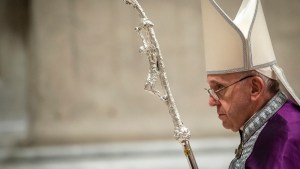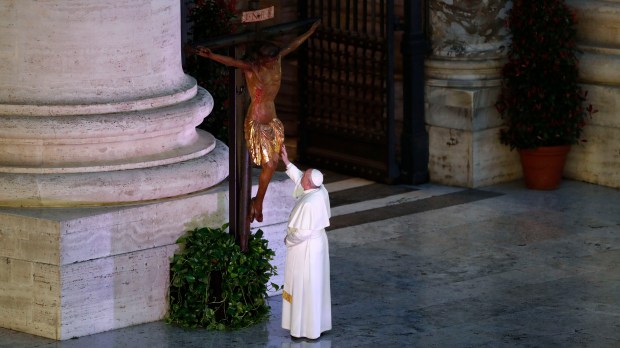In the general audience of April 8, Pope Francis offered a striking insight into Jesus’ revelation as the Son of God.
[F]urther ahead in the Passion account, we discover something surprising. When Jesus dies, the Roman centurion, who was not a believer, who was not a Jew but rather a Gentile, who had seen Him suffer on the cross, and had heard Him forgive everything, who had tangibly touched His love without measure, confesses: “Truly, this man was the Son of God” (Mk 15:39). He says the exact opposite of what the others said. He says that God is there, that He is truly God.
With this reflection, the pope considered what kind of God we have. And standing before the Crucifix, as the Centurion did, can help us to answer the questions that might arise in these days: “What does He do before our pain? Where is He when everything is going wrong? Why doesn’t he resolve the problems immediately?”
Read the full text of the pope’s insightful reflection, with this Vatican translation, emphases ours:
~
Dear brothers and sisters, good morning!
During these weeks filled with apprehension because of the pandemic which is making the world suffer so much, among the questions that we are asking ourselves there may be one also about God: What does He do before our pain? Where is He when everything is going wrong? Why doesn’t he resolve the problems immediately? They are questions we ask about God.
The account of Jesus’ Passion, which is accompanying us in these holy days, is helpful to us. There are many questions, in fact, even there. After having welcomed Jesus triumphally in Jerusalem, the people asked themselves if he would finally free the people from their enemies (cfr Lk 24:21). They expected a powerful and triumphant Messiah yielding a sword. Instead, one arrives who is meek and humble of heart, whose call is one of conversion and mercy. It is precisely the crowd, who had first sung Hosanna, who cries out: “Let Him be crucified!” (Mt 27:23). Confused and frightened, those who followed Him abandoned Him. They were thinking: if this is Jesus’s fate, He is not the Messiah, because God is strong, God is invincible.
But, we read further ahead in the Passion account, we discover something surprising. When Jesus dies, the Roman centurion, who was not a believer, who was not a Jew but rather a Gentile, who had seen Him suffer on the cross, and had heard Him forgive everything, who had tangibly touched His love without measure, confesses: “Truly, this man was the Son of God” (Mk 15:39). He says the exact opposite of what the others said. He says that God is there, that He is truly God.
Today, we can ask ourselves: which is God’s true face? We normally project onto Him who we are, to the highest power: our success, our sense of justice, and even our indignation.
The Gospel, however, tells us that God is not like that. He is different and we cannot know Him by our own efforts. It is because of this that He made Himself our neighbour, He came to us and precisely during His Passover He completely revealed Himself. And where did he reveal Himself completely? On the cross. There, we learn the features of God’s face.
Let us not forget, brothers and sisters, that the cross is God’s cattedra. It would do us good to remain gazing silently at the Crucifix and see who our Lord is: it is the One who does not point a figure against anyone, not even against those who are crucifying Him, but opens wide His arms to all; who does not crush us with His glory, but who allows Himself to be stripped for us; who does not love with His words, but gives us His life in silence; who does not force us, but who frees us; who does not treat us like strangers, but takes our evil on Himself and takes our sins on Himself.
And this, to free us from our prejudices regarding God, let us gaze on the Crucifix. And then, let us open the Gospel. In these days, all of us in quarantine and at home, confined, let us take these two things in our hands: the Crucifix, let us look at it; let us open the Gospel. This will be for us – let us say – like a great domestic liturgy, because in these days we cannot go to Church. The Crucifix and the Gospel!
In the Gospel, we read that when the people go to Jesus to make Him king, for example after the multiplication of the loaves, He departs from them (see John 6:15). When the devils want to reveal His divine majesty, He silences them (see Mk 1:24-25). Why? Because Jesus does not want to be misunderstood, he does not want the people to confuse the true God, that is humble love, with a false god, a worldly god who puts on a show and imposes himself forcefully. He is not an idol. He is God made man, like any one of us, and He expresses Himself as a man but with the strength of His divinity.
Rather, when does the Gospel eventually solemnly proclaim Jesus’s identity? When the centurion says: “Truly this was the Son of God.” It is said there, just after He gave His life on the cross because we can no longer be mistaken: we see who God is omnipotent in love, and not in any other way. It is His nature, because He is made that way. He is Love.
You might object: “What can I do with such a weak God, who dies? I would prefer a strong God, a powerful god!” But you know, the power of this world passes, while love remains. Only love protects the life that we have because it embraces our weaknesses and transforms them.
It is the love of God which at Easter healed our sin with His pardon, who made of death a passage to life, who changed our fear into trust, our anguish into hope. Easter tells us that God can turn everything into good, that with Him we can truly be confident that all will be well.
And this is not an illusion, because Jesus’ death and resurrection are not an illusion: they are the truth! This is why on Easter morning we are told: “Do not be afraid!” (see Mt 28:5). And the agonising questions regarding evil do not vanish all at once, but find in the Risen One a solid foundation that allows us not to go down with the ship.
Dear brothers and sisters, Jesus changed history by drawing near us, and He made it a story of salvation, even if it is still marked by evil. Offering His life on the cross, Jesus conquered even death.
From the open heart of the Crucified one, God’s love reaches each one of us. We can change our own history by drawing near to Him, accepting the salvation He offers us.
Brothers and sisters, let us open all of our heart to him in prayer, this week, these days: with the Crucifix and with the Gospel. Do not forget: with the Crucifix and with the Gospel. The domestic liturgy will be this.
Let us all open our heart in prayer, let us allow His gaze to rest on us, and we will understand that we are not alone, but loved, for the Lord does not abandon us and He never forgets us, never. And with these thoughts, I wish you a Holy Week and a Holy Easter.

Read more:
Mercy with misery: Read the pope’s poignant invitation to set our eyes on Jesus, who has set us free

